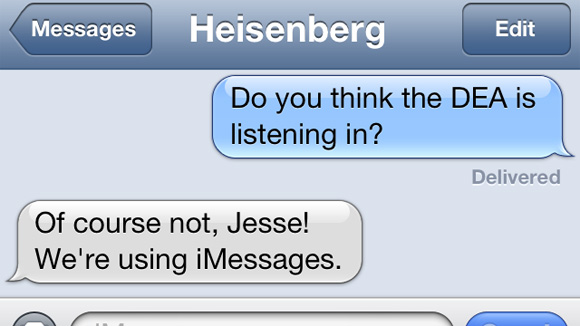Apple denies any knowledge of Prism, releases the details to prove it
We don't know nuffin, guv!

Sign up for breaking news, reviews, opinion, top tech deals, and more.
You are now subscribed
Your newsletter sign-up was successful
Apple has joined Facebook and Microsoft in revealing the number of data requests it received from the government between December 2012 and May 2013, following the NSA Prism scandal.
Between 4,000 and 5,000 requests were made by U.S. law enforcement agencies within that time, which covered between 9,000 and 10,000 user accounts or devices.
Apple claims that these requests included "both criminal investigations and national security matters", with examples including robbery investigations or searches for missing persons.
"We do not provide any government agency with direct access to our servers, and any government agency requesting customer content must get a court order," said Apple in the statement revealing the new information.
SpyMessage?
Apple also added that all iMessage and FaceTime conversations are protected by encryption at both ends and are completely impossible to intercept – even by Apple.
"Apple cannot decrypt that data. Similarly, we do not store data related to customers' location, May searches or Siri requests in any identifiable form," it said.
As the statement claims, Apple had not even heard of Prism until the story broke on June 6, which saw the company, alongside the likes of Google, Facebook and Microsoft, accused of giving the NSA access to users' private information.
Sign up for breaking news, reviews, opinion, top tech deals, and more.
Apple was able to disclose the details after getting permission from the US government to report on requests related to national security.
Facebook and Microsoft also laid out the number of requests they had received for user data, and while the numbers were a bit higher than Apple's, both companies had a similar story to tell. However, all companies seem determined to keep pushing for greater transparency.

Hugh Langley is the ex-News Editor of TechRadar. He had written for many magazines and websites including Business Insider, The Telegraph, IGN, Gizmodo, Entrepreneur Magazine, WIRED (UK), TrustedReviews, Business Insider Australia, Business Insider India, Business Insider Singapore, Wareable, The Ambient and more.
Hugh is now a correspondent at Business Insider covering Google and Alphabet, and has the unfortunate distinction of accidentally linking the TechRadar homepage to a rival publication.